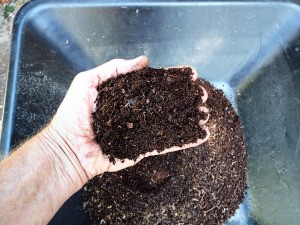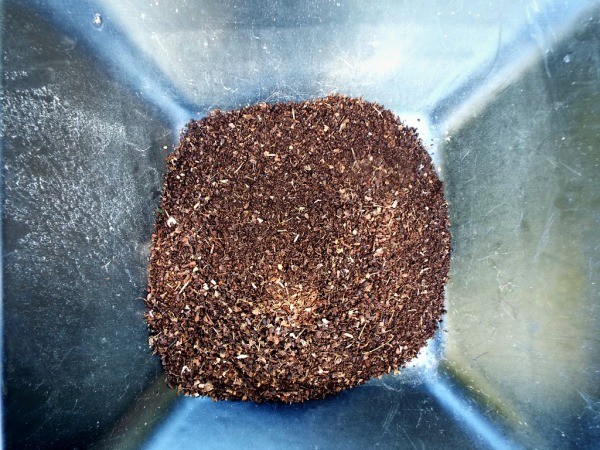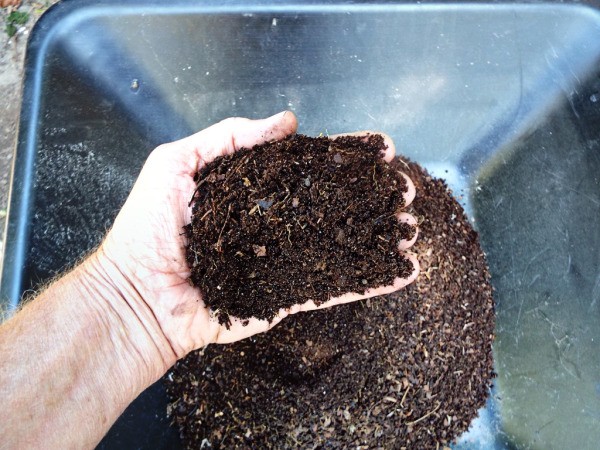 Technically, this would be a 'medium' rather than soil, but some people haven't caught on to that word, yet. And too, if you have access to enough, it would be great for the garden as well as your houseplants.
Technically, this would be a 'medium' rather than soil, but some people haven't caught on to that word, yet. And too, if you have access to enough, it would be great for the garden as well as your houseplants.
In one out of the way places on my property, goes debris, grass clippings, leaves, fallen rotted tree limbs, just about any vegetable matter, even watermelon rinds. I have a long row of this stuff. One end of this row is new, where I've recently added stuff. The other is the aged end. That's where the stuff has broken down over the years; and where I find black gold.
But you don't need a lot of area with trees and grass to get what I have pictured. At the 'old' end of my debris row (the one most out of sight) is where I have several black plastic bags filled with nothing but maple leaves. Some of my leaves go into the debris pile, some go into plastic bags.
The 'medium' pictured is no more than pure maples leaves that have aged for a year, or years, in black plastic lawn bags. It's the next thing to leaf mold. According to 'ladyleeshome', leaf compost has the same benefits as leaf mold (builds soil structure, retains water, and improves soil life), produces healthier plants with fewer pest issues).
And all I did to get this free miracle stuff was to put bags of leaves in an out of the way place and forget about them for a while. Well, not forget entirely. You would want to check the moisture content inside the bags 2-3 times a year. The leaves should always be moist, never dry, never wet. Occasionally, you might need to add a bit of water.
So, if your city is like mine, collecting leaves each fall, composting them, and then giving them away; you can go get your share, or as most people do, you can go buy potting soil. But if you're smart and have leaves, you can bag them, keep them in an out of the way place and enjoy your own, completely free, leaf compost.

This stuff is great for house plants. You can use it alone or as an extender for bought potting soil. If you use it alone, it's a good idea to add some vermiculite and some time released fertilizer.
As I said, some of my leaves go in with other debris and some into bags. I know the bagged leaves will be practically free of any weed and grass seeds and free of any chemicals I might use on the lawn.
People in the know, who have a garden and access to leaves, put those leaves in the garden each year. As I tried to explain to my neighbor, (he didn't get it), the leaves are like a stick of wood. A stick of wood will keep you warm only as long as it is burning, once it's burned out, that's it. It's the same with leaves in your garden or house plant medium. They are good for the plants only as long as they are breaking down. Once they have completely broken down, the plants cannot make use of them any longer.
This is why the keepers of huge plants in huge containers, where it would be impractical to change the soil, yearly remove the upper layer of soil and replace it with what is called a 'top dressing'. This top dressing would be a substance that has not yet broken down, but in the process.
This page contains the following solutions.
It is spring and I have been busy repotting and potting plants for the front of the house and the patio. I never buy the store-bought, chemically tainted top soil! I compost all year long.
Check your compost bin for sprouts of "mystery plants". One of the most frequent in my bin, and also popping up in the garden where I have spread compost around my roses, etc. is tomatoes.
The recipe for making compost is simple. Start with some greens, add in as many browns, toss in a handful of dirt, and moisten with water. Stir occasionally and let cook for a few months to a few years, depending on the temperature of the pile.
Let Mother Nature help you with your spring planting! If you add compost to your garden beds every year like I do, you may (or may not) know that usually the bags recommend that you let the compost "mellow" before you plant into it.
Here are the questions asked by community members. Read on to see the answers provided by the ThriftyFun community.
I have compost that looks like wood chips from the city and it has dried out. Can I use this for mulch on my veggies that I just planted?
By RMR from Tallahassee, FL
Most cities sell their wood chips as mulch, not compost. It can be used, however, decaying wood chips steal nitrogen from the soil (for the decaying process).
Can I reuse compost that has had tomatoes which were affected by blight? I usually reuse the compost from the greenhouse to grow the following year's new potatoes in bags.
By Ronnie from Essex, England
Tomato blight needs living plant tissue to survive, which means it won't survive in a compost heap. It is fine to use the compost.